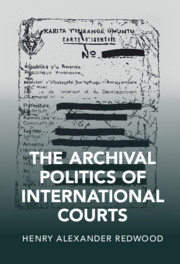This article investigates the difficult issues that have been raised in relation to witness tampering before international criminal courts. This is a significant problem for international criminal courts and tribunals, but has not yet been the subject of a great deal of comment. The article begins by setting out the difficulties that the courts and tribunals have encountered, through a discussion of their judgments on this point. It then turns to the black-letter law that the courts and tribunals have adopted to attempt to counter witness tampering. However, a description of the law alone cannot give a full picture of the difficulties that witness tampering, and protecting witnesses from it, present to international criminal courts and tribunals. These are explained, in part, through the fact that international criminal courts and tribunals operate in the absence of an effective international enforcement mechanism. This, and the conflict/post-conflict context against which those bodies tend to operate, is discussed, in part through the lens of the complementarity paradox identified by Paulo Benvenuti. The article concludes that although lessons can be learned from domestic approaches, the main limitation is the absence of any enforcement power at the international level, and that it is unlikely that one is likely to be created soon.
